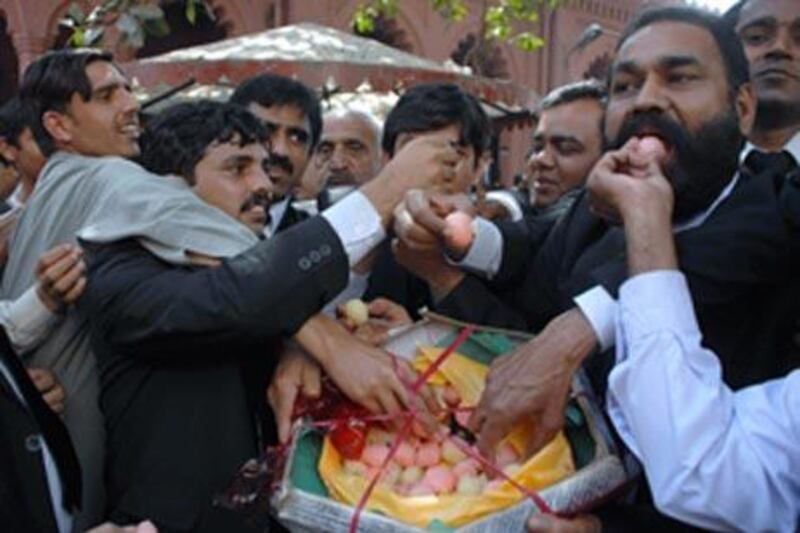ISLAMABAD // Pakistanis yesterday heaved a collective sigh of relief at the eleventh-hour aversion of an explosive political crisis and have welcomed the shift in the balance of power away from the office of the president that has resulted from the crisis. The presidency has considerable power in Pakistan since the 1951 assassination of the country's first prime minister, Liaquat Ali Khan.
Since then, the powers of the president have been augmented by a succession of military dictators who adopted the title, each of them finding justification for dictatorship in the political follies of elected prime ministers. To date, the president has retained the authority to dismiss parliament, but that is set to change. The restoration of Iftikhar Mohammed Chaudhry, the chief justice, is but the first act in a process of political reform that will shift power from the presidency to parliament.
Previous attempts to strip the presidency of its overbearing powers, notably through the 1973 constitution and a 1997 amendment that reversed military-imposed amendments, failed because they replaced the presidential form of one-man rule with a prime ministerial equivalent. The subsequent imposition of military rule in 1999 by Pervez Musharraf saw the powers of the president reinstated, along with the establishment of the national security council, a constitutional body in which armed services chiefs and the president outgunned the prime minister and elected chief ministers of the four provinces.
The prospect of permanent exclusion from national politics in 2006 persuaded Benazir Bhutto and Nawaz Sharif, the exiled leaders of Pakistan's two largest political parties, the Pakistan Peoples Party (PPP) and Pakistan Muslim League-Nawaz (PML-N), to sign a pact known as the Charter of Democracy. Its key elements were the transfer of power away from the "me" of the offices of the president and prime minister to the "we" of parliament, and the establishment of an independent judiciary.
The failure by Asif Ali Zardari, the president and Bhutto's widower, to implement those two elements of the charter are what sparked the recent descent into political turmoil; the offer of Yousaf Raza Gilani, the prime minister, to implement them is what averted a breakdown of the fledgling democratic set-up. Coming days will see a rapid succession of events. The Supreme Court will hear a government petition, filed yesterday, seeking to overturn a Feb 25 ruling that disqualified Mr Sharif and his younger sibling, Shahbaz, the chief minister of Punjab province, from holding public office.
Its outcome is virtually assured and will see Nawaz Sharif return to parliament for the first time since his overthrow in Oct 1999. However, the fact remains that Shahbaz Sharif will not be able to reform the Punjab government without the support of the PPP. Their working together will be the first major test of the PPP's rapprochement with the PML-N. The next will be the introduction of a constitutional reforms package in parliament by Mr Gilani, who will be seeking a unanimous vote.
A direct, ironic consequence will be the forcible retirement of all Supreme Court judges who took their oath of office under two provisional constitutional orders introduced by Mr Musharraf to create legal legitimacy for his 1999 coup d'état and 2007 imposition of emergency rule. In effect, Mr Chaudhry will serve as chief justice for a matter of weeks, during which he, his Supreme Court colleagues and the chief justices of the four provincial high courts would vet candidates to succeed them.
The final phase of the political transition will see Mr Sharif decide whether to rejoin the federal government coalition; the PML-N had joined hands with the PPP after Feb 2008 elections, but split over Mr Zardari's refusal to restore the chief justice. That will certainly be pursued by Mr Gilani, the prime minister, with active encouragement from the army chief, Gen Pervez Ashfaq Kayani, and the US and UK governments - an assertive troika that brought about yesterday's climbdown by Mr Zardari.
Mr Gilani, who was initially dismissed as a powerless lackey of Mr Zardari, has earned universal respect for his conciliatory stance since the Feb 25 court ruling against the Sharifs and the subsequent imposition of federal rule in Punjab. His emerging moral leadership role will be repeatedly tested: he must continue to pilot the process of political rapprochement and constitutional reform, as well as heal the rifts within the PPP caused by the hardline actions of Mr Zardari.
Under the emerging scenario, the role of the prime minister will be to act as senior statesman to ensure democratic continuity. Mr Gilani may in practice hold relatively little administrative power, but he has the opportunity to create a historic legacy in strife-torn Pakistan. thussain@thenational.ae





